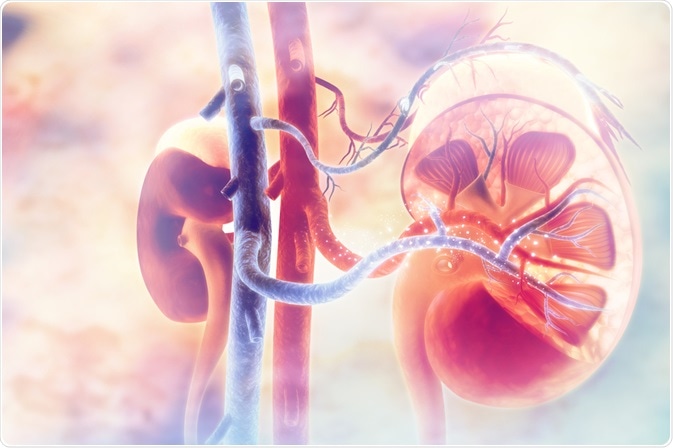Cystinosis is an inborn error of metabolism which leads to the abnormal accumulation of an amino acid called cystine in the lysosomes of cells. Cystinosis is therefore a type of lysosomal storage disease.
 Cystinosis is the leading cause of Fanconi syndrome, where damaged kidney tubules release important minerals and nutrients into the urine, meaning they need to be replaced. Image Credit: crystal light/Shutterstock.com
Cystinosis is the leading cause of Fanconi syndrome, where damaged kidney tubules release important minerals and nutrients into the urine, meaning they need to be replaced. Image Credit: crystal light/Shutterstock.com
Genetic cause of cystinosis
The condition is caused by a mutation in the CTNS gene that codes for a protein called cystinosin. When protein degradation occurs inside a lysosome, this protein usually carries cystine out of the lysosome and into the cytoplasm.
In people with cystinosis, the CTNS mutation leads to a dysfunctional cystinosin protein and impaired transport of cystine. Cystine remains in the lysosome, where it accumulates and forms crystals. The cystine builds up to between 50 and 100 times the usual cystine content.
This toxic accumulation of cystine in the cells has the potential to affect every organ in the body and symptoms of the condition are therefore diverse. Cystinosis is the leading cause of Fanconi syndrome, where damaged kidney tubules release important minerals and nutrients into the urine, meaning they need to be replaced. Before treatments became available, cystinosis would eventually lead to kidney failure by the time a child was aged 9 or 10 years. Today, if treatment is started early and taken consistently, this outcome and other complications of the condition can be delayed.
Cystinosis is a rare condition that is estimated to affect about 1 in every 100,000 to 200,000 individuals. The condition is thought to affect about 500 children in the United States and 2000 worldwide. Incidence is higher in Brittany, France where 1 in 26,000 individuals are affected. The condition generally affects blond-haired, blue-eyed, European children, but it can arise in other ethnicities.
The CTNS gene is located on the short (p) arm of chromosome 17 at position 13. Cystinosin contains 367 amino acids along with 8 glycosylation sites and 7 transmembrane domains.
Inheritance of cystinosis
Cystinosis is inherited in an autosomal recessive fashion, meaning a person needs to inherit two abnormal copies of the CTNS gene - one from each parent - in order to develop the disease.
.jpg) Cystinosis is inherited in an autosomal recessive fashion. Image Credit: Meletios Verras/Shutterstock.com
Cystinosis is inherited in an autosomal recessive fashion. Image Credit: Meletios Verras/Shutterstock.com
In recessive genetic disorders, a recessive gene remains dormant until two parents who each possess the mutated gene have children. The parents do not show any signs or symptoms of the condition, but the odds of their offspring inheriting two abnormal copies of the gene developing the condition is 25%.
There is a 50% chance that the child will inherit only one copy of the mutated gene and be a carrier of the condition who remains healthy, like their parents. The odds of the child inheriting a normal copy of the gene from each of their parents is also 25%. These children are neither carriers of the condition, nor are they at risk of developing the disease.
If only one parent carries the gene mutation, any of their offspring each has a 50% chance of being a carrier themselves, but will not develop the condition. If one parent is a carrier but the other parent is affected by the condition, then each child has a 50% chance of being a carrier, but will not develop the condition.
If one parent is not a carrier and the other has cystinosis, then each child has a 100% chance of also being a carrier, but will not develop the condition. These odds apply to every pregnancy and remain the same for both genders.
As the emergence of this disease is so unpredictable and parents never show any signs or symptoms, a diagnosis of cystinosis is usually a shock to parents and other family members.
More than 80 different CTNS mutations have been identified as causative of cystinosis. The most common mutation is a deletion of a large part of the gene (57,257 base pairs) which leads to a complete loss of cystinosin. This mutation is found in nearly 50% of those diagnosed with the condition who are of northern European descent.
Mutations that affect smaller regions of the CTNS gene give rise to less severe dysfunction of the protein, which can still fulfill some of its role and therefore causes milder forms of the condition.
Cystinosis - causes, symptoms, diagnosis, treatment, pathology
References
Further Reading
Last Updated: Mar 11, 2023